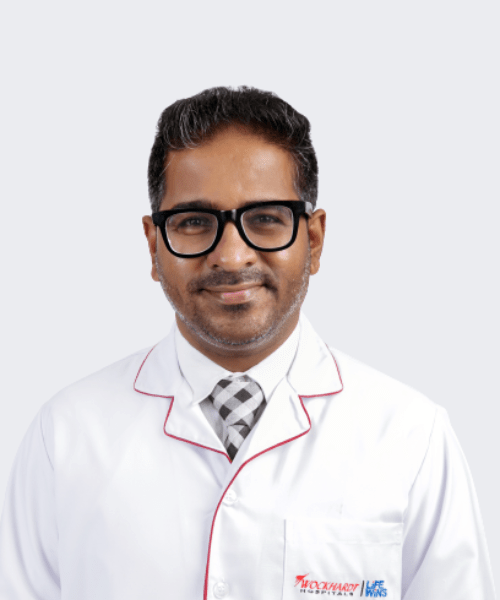Home » Speciality » Dental Clinic
BEST DENTAL SURGERY &
TREATMENT IN INDIA
dental surgery experience for patients.

Why Choose Wockhardt Hospitals
for Dental Treatment?
At Wockhardt Hospitals, we strive to offer you highly effective dental treatment. Our expert team of dental experts is highly experienced and board-qualified and conforms to international standards. We will help you with all the dental problems and usually opt for non-surgical ways to treat any dental condition until surgery is the last option. We use cutting-edge technologies for dental procedures to ensure minimal to no complications.
Our doctors specialize in the following fields(not limited to)-
- Conservative dentistry and Endodontics
- Preventive and pediatric dentistry
- Periodontology
- Oral and maxillofacial surgery
- Oral medicine and radiology
- Dental implants
- Prosthodontics
- Oral Pathology
- Geriatric dentistry
- Cosmetic dentistry
At Wockhardt Hospitals, we offer the best dental treatment in India. We are available and willing to see our patients at any time in case of an emergency.
Renowned Dentists
at Wockhardt Hospitals
The following are the renowned dentists at Wockhardt Hospitals-
- Mumbai Central
- Mira Road
- Nagpur
- Rajkot
Why Dental Care is Important?
Dental care is important to maintain a healthy mouth, teeth, and gums, which helps improve your overall health. You must always visit a dentist and get your teeth checked every month. This is because crooked, missing, or diseased teeth, if not treated on time, can interfere with your daily life as they can hinder chewing food properly and speaking. If the problem worsens, it can lead to corrective surgical procedures, which might burn a hole in your pocket. Also, an unhealthy set of teeth and bad mouth hygiene can lower one’s confidence. You must always adopt healthy dental habits such as :
- Visiting the dentist once a month
- Change your toothbrush every 3-4 months
- Avoid the usage of tobacco
- Eat a healthy diet and avoid too much coffee and tea
- Floss daily and brush twice a day
Symptoms of Tooth Decay
Tooth decay or cavities are holes in your teeth. This happens when the acids in your mouth break down the enamel, your tooth’s outer layer. This is a common condition and can happen to anyone. Brushing and flossing your teeth can help if the tooth decay is at the first stage. However, allowing the plaque or the decay to build up can erode all your teeth and create cavities.
Tooth decay usually does not cause pain at first. However, as tooth decay reaches beyond enamel, the symptoms start showing up. Some of the symptoms are as below :
- Facial swelling
- Bleeding gums
- Bad breath or bad taste
- Toothache
- Sensitivity to hot and cold food or drinks.
You must always seek a doctor’s attention to see the best dental treatment once you have identified the plaque. This is because, if left untreated, the cavity can destroy all your teeth and create severe complications as the infection goes into your bloodstream and can be life-threatening.
What are the Main Causes
of Dental Problems?

Dental problems can cause serious complications in your life. Thus, you must take preventive measures to stop it. However, you must understand the cause of the dental problem :
- Poor health hygiene
- Plaque formation
- Plaque bacteria and acids
- Chronic dry mouth
- Usage of tobacco and excessive smoking
- Not brushing at all
- Medical problems.
What are the Five Most
Common Dental Problems?
The following are the 5 most common dental problems :
- Gum Disease
Gum disease is an early stage of Gingivitis caused due to plaque buildup. The common symptoms of gum disease are swollen, red, bleeding gums, bad breath, and sensitive teeth. This usually happens if you skip brushing and flossing daily. If left untreated, it can become periodontitis, a severe gum disease. It leads to the loss of a tooth, change in bite, unpleasant taste, and breath.
- Bad Breath
Gum disease is an early stage of Gingivitis caused due to plaque buildup. The common symptoms of gum disease are swollen, red, bleeding gums, bad breath, and sensitive teeth. This usually happens if you skip brushing and flossing daily. If left untreated, it can become periodontitis, a severe gum disease. It leads to the loss of a tooth, change in bite, unpleasant taste, and breath.
- Sensitive Teeth
Your teeth become sensitive when exposed to hot and cold foods. This is because when the enamel wears away and the dentin is exposed, the deeper nerve inside the tooth becomes sensitive.
- Receding Gums
Receding gum is also one of the most common dental problems which can also lead to other dental conditions, such as losing a tooth. This is because as the gum recedes, the tooth’s root is exposed, making it susceptible to damage. The condition can be caused due to the following factors –
- Smoking
- Poor dental hygiene
- Brushing your teeth too hard
- Hypertension or high blood pressure
- Hormonal fluctuations in women
- Dry Mouth
How to Recover Fast
After Teeth Surgery?
Recovery from oral surgeries takes days. However, with the following dental care steps, you can recover early :
- Rest
Take 2-3 days off from everything – work, school, college to ensure you are getting proper rest. You can usually resume your activities after 24-72 hours. However, do not get involved in strenuous activities after your tooth treatment.
- Protect the Surgical Area
Limit talking, eating heavy food, and drinking for the first few hours. Also, stick to a liquid diet, and avoid spitting to avoid disturbing your wounds. Do not eat too hot or chewy food, which might irritate the wound.
- Stay Hydrated
Drink plenty of water. However, take small sips instead of using a straw, as the suction might cause damage to the wound. Also, avoid consuming carbonated liquids, caffeine, or hot beverages and drinks, as it might irritate the teeth surgery area.
- Use Cold Compress
Apply oral compresses as advised by your dentist. They usually advise cold compresses for the first 24 hours to minimize swelling, discomfort, and bruising.
- Take Pain Medications
Oral surgeons usually direct pain medication. They might prescribe OTC painkillers or prescribe something more potent depending on the condition and severity.
- Take Care of Your Oral Health
Use a soft-bristled toothbrush to brush your teeth. Be gentle around the surgical area, and the doctors might advise you not to use water to rinse your mouth. You can use lukewarm water with salt every few hours after each meal within 24 hours of the surgery.
What are the Different Types
of Dental Surgery?
- Root Canal Surgery
- Dental Implants
- Wisdom Tooth Extraction
- Reconstruction Surgery
- Cosmetic Surgery
FAQs on Dental Surgery
Q. I have sensitive teeth. What can I do?
- Use salt water to rinse your mouth
- Use desensitizing toothpaste
- Rinse your mouth using honey and water
- Green tea can be helpful
Q. What can I do to treat my swollen face?
- Use a cold compress as it helps to reduce the swelling and inflammation.
- Avoid processed and salty food before bed.
- Wash your face with cold water after you wake up.
- Don’t sleep with your makeup on, as it can trigger inflammation
- Avoid alcohol
- Use cold cucumber juice on your face, as it has antioxidants that can help with swelling.
Q. What are Wockhardt Hospitals’ dental charges?
Q. Do I need to floss?
Q. Should I see a dentist if I don't have symptoms?
Q. What is the recovery time for dental surgery?
Q. What is the success rate of dental operations in India?
In India, the five-year success rate for dental surgery is 95%.
























